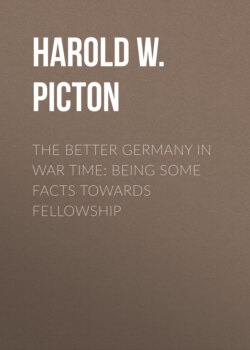Читать книгу The Better Germany in War Time: Being Some Facts Towards Fellowship - Harold W. Picton - Страница 35
На сайте Литреса книга снята с продажи.
Burg.
ОглавлениеTable of Contents
At Burg, at the canteen, “we used to treat one another to a whole roll or a cake and a cup of excellent coffee; and, until they were put on the verboten list, to a chop or steak. The serving was done under the direction of a kind, motherly Frau at the one canteen, and by a polite German boy-waiter at the other. … The regular meals seemed to be provided by the proprietor of the larger canteen under contract with the German Government. They were served at 8 a.m., 12 noon and 6–30 p.m. In quality they were superior to the Torgau fare, but in quantity scarcely sufficient in the depth of winter for hungry young men. Still it must be remembered that they cost only 1s. 6d. a day” [out of the daily pay allowed]. Weekly baths were the regulation, but “it was often possible for pushing natures to get an extra bath on other days,” by a method which works all the world over. At Burg “the new Commandant was a tall, well-made, soldierly figure. He had a strong face, curiously resembling an owl.” An amusing little story follows as to the preciseness of the Commandant and Mr. O’Rorke continues: “It is pleasant to add that this new Commandant was in one respect just the man that was needed. From the first day he began to make the place hum, the foul clean, and in time rendered it habitable. Had there been any, he would have made the dust fly, but there was not. Indeed the court was at first almost a bog through which we threaded our way inch deep in mud, and hopped over the pools. All this disappeared in a few weeks under the Commandant’s direction; the swamp was drained and the path widened.” British officials, too, know that the problem of mud in a confined space trodden by thousands of feet is one needing energy for its solution.
The Commandant seems to have had a quality more valuable even than energy—a capacity for learning from those under him. He was a judge by profession, and was at first stern and terrible, as well as thorough. To him the prisoners were as ordinary prisoners, “but in time he learnt to place us in a different category. As for myself, eventually he granted me facilities for carrying on my work outside the Lager, which he might easily have refused, and when, five months later, we parted, it was with a certain measure of mutual cordiality” (p. 74). The Adjutant also learned more cordiality, and adjutants are sometimes prouder of making others feel their authority than commandants are.
